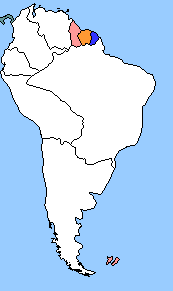The answer to your question is one of timing, power and the types of colonies.
There were 5 countries that were the main competitors in the global colonization game. The Spanish, Portuguese, English, French and Dutch.
Simply said the Spanish and Portuguese were about 100 years ahead of the rest, Also known as the Age of Discovery. Portugal and Spain, due to their geographic "isolated" location in Europe, made peace with each other in 1411 (Treaty of Ayllón). While the rest of Europe were in constant war-mode Portugal and Spain prospered and were able to explore. They had trade routes and outposts in Africa and Asia already, but they were looking for a shorter eastern route to India. They left most of North America alone and ended up in South America and the Caribbean. The Treaty of Tordesillas divided the world up in Spanish and Portuguese.
The Dutch, English and French came in action too late and had a different purely business economic interest in the area. The Portuguese and Spanish were in it for "Gold and God". The Portuguese and Spanish came as an army with mostly males. They married native and African women, creating the large mestizo and mullatos population we see in Latin America.
The Dutch and French tried and even managed to claim parts of South America. The largest colony was New Holland from 1630–1654, but lacking the military and population backup (and not mixing with the locals) they Portuguese took the area back again.
The Dutch, French and Englished focused more on the Caribbean with their sugar plantations, which were closer to Europe and made them not wanting Brazil back, because the economic necessity was not there.
Suriname was a Dutch Colony which they shared with the English called Guyana. They got total control over Suriname after a trade against New Amsterdam with the English. The other parts were called (British) Guyana. and French Guyana.
More useful information on The differences in colonization: British, French, Spanish, Portuguese, who drew his information from the source: The Great Migrations: From the Earliest Humans to the Age of Globalization (2008)
